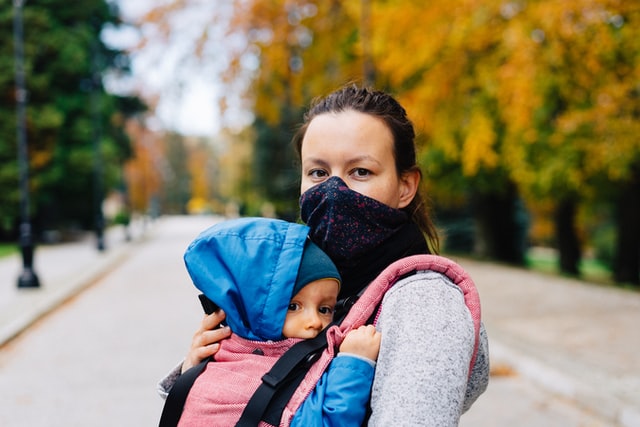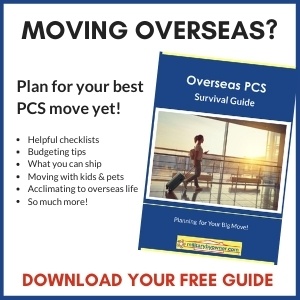Moving to Germany During the Pandemic: 5 Tips for a Smooth(er) Move
Congratulations on getting those coveted orders to Germany! If you’re feeling a little hesitant—whether it’s because it’s your first overseas assignment, or maybe because of the state of the world (hello, pandemic), hopefully this post will ease your worries, and get you excited for your upcoming adventure.
In June 2020, our family of five hopped on the emptiest flight we’ve ever flown on. We took off in San Diego, California, and landed in Düsseldorf, Germany, ready for our second OCONUS assignment, but our first time living in Germany.
We were exhausted, but also so ready to let out a long sigh of relief (through our masked mouths); we finally made it to the other side. A PCS move overseas isn’t for the faint of heart, especially with a global pandemic rampant around the world.
Here are five things to keep in mind as you embark on your OCONUS PCS adventure to Germany during a pandemic. It may be stressful, and not quite what you’re used to, but you will get through it, and you can still make the most of your time in the land of schnitzel, beer, and pretzels.
 1) Seek out a Sponsor
1) Seek out a Sponsor
If you’re moving to Germany, I highly recommend asking for a sponsor from the squadron/unit you’re entering (some base’s even offer spouse sponsors). A sponsor can act as your liaison and answer specific questions you have before arriving. Sponsors are volunteers who go through specific sponsor training so they can help newcomers.
Learn more: What an Overseas Sponsor Meant to Our Military Family.
Sounds pretty perfect, right? Not only that, but they help you navigate your new way of life after you arrive.
 Photo by Angel Barnes on Unsplash
Photo by Angel Barnes on Unsplash
A sponsor can help especially with things like setting up your temporary accommodations, helping with transportation, making sure your mailbox is active, getting groceries, setting up in processing appointments for the military member, etc.
Having a sponsor is an invaluable resource when you’re moving to Germany.
2) Enjoy Your ROM Time
Instead of seeing the sights, house hunting, experiencing jetlag, and gathering essentials to fill our new guest house fridge, we drove straight to our temporary accommodations and remained there for two solid weeks.
At the time (summer of 2020), we were told we literally couldn’t even walk out our front door because of the strict quarantine in place (this was back in the early days of the pandemic, so check with your command for the current regulations).
Our strict two-week stay-at-home order (or ROM; restriction of movement) ended up being a blessing in disguise. We managed to get over jet lag and adjust to Germany’s very (very) long summer days, and we eased into learning about our new country without feeling completely overwhelmed.
 Photo by Stephen Andrews on Unsplash
Photo by Stephen Andrews on Unsplash
It was also the longest our family had ever been with each other in a very, very long time—nobody was jetting off to work, school, a TDY, or a deployment; it was like we had a solid 14-day vacation to just relax.
We knew about our quarantine ahead of time, so we tried to plan accordingly. Before we left the U.S., I shipped our sponsor a flat-rate box stuffed with games, toys, activities and other fun surprises for my kids. I did a Pinterest search for “games you can play in a hotel room,” and it’s amazing what all you can do with some paper plates and a roll of tape.
 Photo by National Cancer Institute on Unsplash
Photo by National Cancer Institute on Unsplash
Thankfully, our guest house included a kitchen, so we got pretty creative with our meals (especially since I wasn’t doing the shopping). Cooking for five people in a new country when you can’t do the grocery shopping was challenging, but I packed some tools in our suitcase to help get the job done.
It’s never fun to be told that you literally can’t go outside your front door, but we made the most of it.
3) Pack Your Patience
Okay, “packing your patience” might sound obvious and slightly cheesy, but it’s absolutely essential when you’re moving to Germany, especially during a pandemic.
 Photo by Luis Fernando Felipe Alves on Unsplash
Photo by Luis Fernando Felipe Alves on Unsplash
Things don’t move as quickly or as efficiently as they do in America, even during normal times. And until you get the hang of things, you may find yourself taking more deep breaths than usual. Keep in mind that you’re the guest in this new place.
Here are some examples of things that may be different from what we’re used to:
- In Germany, grocery stores are completely closed on Sundays.
- Sometimes stores won’t take your specific kind of credit card (have a different one on hand, or cash, just in case.
- The language barrier can be tricky and leave you flustered.
- Something as simple as dialing a phone number is easier said than done.
- You may not have high-speed internet right away (not to freak you out, but we’ve been waiting seven months for our internet to be installed).
All that to say: patience and kindness can go a long way.
 Photo by Marcin Jozwiak on Unsplash
Photo by Marcin Jozwiak on Unsplash
4) Dream Big & Explore Local
“Move to Europe,” they said. “You can travel all over,” they said.
Okay, here’s some hard truth if you’re moving to Germany during the current pandemic: a lot of things/places are closed right now…including hotels throughout the country. And in some German states/towns, you can’t go further than 15 kilometers from your home.
 Photo by Corinne Kutz on Unsplash
Photo by Corinne Kutz on Unsplash
The situation in Germany—as well as all of Europe—is extremely fluid, and it’s hard to keep up with the current restrictions, including those from your command.
Germany, in one way or another, has been under a “hard lockdown” since November 2020. At the time of writing this post (beginning of April 2021), some German states have eased up on the restrictions by allowing elementary schools to open and a few types of stores, but other states have put an “emergency brake” back on the ease of restrictions because cases are going back up.
All that to say: everything is constantly changing. And “not being able to travel” is a hard realization for those of us who looked forward to all the travel Europe offers.
One way we’re trying to combat the situation and lift our wanderlust spirits is by dreaming big but exploring local. We’ve made a European Bucket List of all the places we want to visit, and we’re adding to it daily. Knowing we’re literally so close but so far to so many places is extremely hard, but knowing we have a list of places to visit once things open up is keeping hope alive.
 Image via Canva
Image via Canva
On the flip side: we’re also exploring locally as much as possible*. There’s no shortage of things to see in and around your town: castles, nature preserves, forests, churches, small towns, unique neighborhoods, etc., and you can do so in a safe and socially distant manner.
Instead of traveling somewhere just out of our reach, we’ve shifted our focus to day trips in locations where we can spend the majority of our time outdoors. And since restaurants are still closed (except for take away), we pack our snacks and try to make it home in time for lunch/dinner.
Seeing what our area has to offer gets us out of the house and helps tap into that fernweh we’re all craving. One way we’ve done this is by geocaching—there's an app you can use worldwide that’s essentially a little treasure hunt to unique places in your area.
*Check with your command’s travel restrictions before going anywhere, of course.
5) Embrace the Culture
Every fiber of your being may want to only shop at your base’s commissary, especially just after you arrive. I totally get it; it’s comfortable and easy. But there’s so much you can gain from shopping local.
 Image via Canva
Image via Canva
As uncomfortable as it may be, rip that comfy band-aid off, put your mask on, and step inside your first German grocery store or local bakery and see what they have.
The first few times you shop out on the economy may be nerve wracking and slightly scary, but it’ll get easier every time you go out. Before long, you’ll find you have a favorite grocery store, and a favorite place to pick up your Brot, Eier, und Milch (bread, eggs, and milk).
It’s true that most Germans speak English, but learning a few words in German goes a long way with showing respect and simply letting them see that you’re trying. Plus, learning German will help you communicate with locals and immerse in the culture even more.
 Photo by Shobhit Sharma on Unsplash
Photo by Shobhit Sharma on Unsplash
You've Got This!
Moving to Germany during a pandemic isn’t as crazy as it sounds. It takes a little mind shift and a lot more patience, but we still have hope things will get better in the future.
If you recently made a PCS move to Germany, we’d love to hear what tips you have or any suggestions for those moving out here sooner than later.






